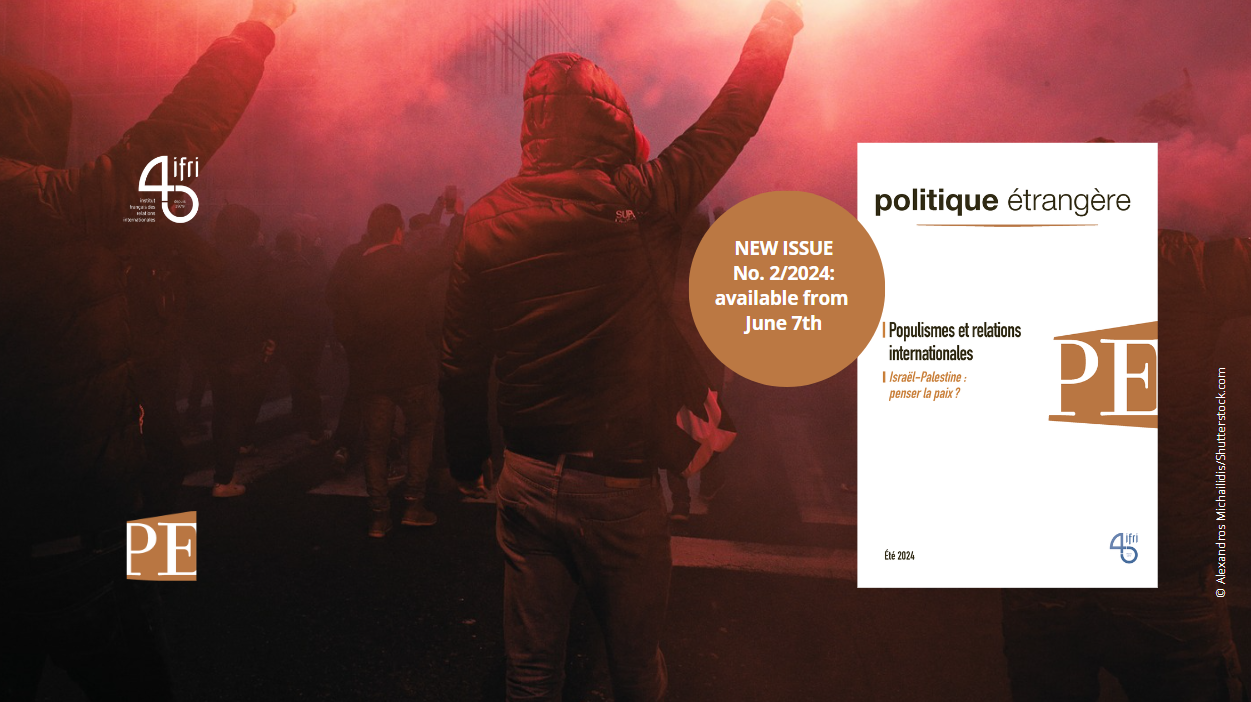Populism and International Relations
Populism is flourishing, in Europe and elsewhere: a populist holds power today in Argentina and perhaps tomorrow in the United States. What does its spread say about our societies? And how is it shaping them, where populists rule? Do their economic policies stand any chance of success? Do their foreign policies have a greater impact on the world around them or at home? If “Trump 2.0” comes to be, will he have a free hand? If so, what can we expect?

Does the tragedy in Gaza leave any room for hope? Can the two-state solution, the only rational one, still be implemented? The challenges are daunting: redrawing a geography fractured by colonization; establishing a credible Palestinian voice that can engage in a long negotiation; seeking acceptance in Israeli society; and rallying a range of foreign powers to take concrete action and push for the only remaining solution.
Beyond Ukraine and Gaza, Africa has been serving as a playing field for rival powers of all stripes: while France retreats and the US hesitates, Russia is advancing and several other states are making their presence felt—Turkey, Iran, the Gulf states, Hungary, even Ukraine. The range of opportunist strategies keeps growing, but is there a common geopolitical rationale underlying them all?
In the interview that opens this issue of Politique étrangère, Thierry de Montbrial analyzes an international scene in which the major instruments conceived in recent decades to foster global governance have been undermined. In particular, he considers the effects of the war in Ukraine and the uncertain destiny of the European Union.
This issue is available in French only: Populismes et relations internationales
Global Governance, Ukraine, and the European Union: Quo Vadis?, by Thierry de Montbrial
POPULISM AND INTERNATIONAL RELATIONS
Populism and the Far Right: What Exactly Do We Mean?, by Jean-Yves Camus
The Diversity and Failures of Economic Populism, by André Cartapanis
What Is a Populist Foreign Policy?, by Sandra Destradi
US Institutions and the “Trump 2” Hypothesis: The Lure of Authoritarianism, by Lauric Henneton
Argentina in the Era of “Mileism”, by Florian Vidal
ISRAEL-PALESTINE: THINKING ABOUT PEACE?
Israel-Palestine: One Solution, Two States, by Élie Barnavi
Israel-Palestine: The Question of Geography, by Michel Foucher
CURRENT AFFAIRS
The Red Sea: A New Geopolitical Era, by Cyrille P. Coutansais
Africa: The New Great Game, by Thierry Vircoulon
Myanmar: Military Victory Unattainable, Negotiated Peace Unlikely?, by Christian Lechervy
BAROMETERS
Paris 2024: The Geopolitics of the Olympic Games, by Jean-Baptiste Guégan
Syria: “Post–Civil War” Reprisals and the Persistence of the Past, by Myriam Benraad
BOOK REVIEWS
Editor: Marc Hecker
L’enchevêtrement des crises au Sahel. Niger, Mali, Burkina Faso, Jean-Pierre Olivier de Sardan
Le djihad de la vache. Pastoralisme et formation de l’État au Mali, Giovanni Zanoletti
Read by Alain Antil
Backfire. How Sanctions Reshape the World Against U.S. Interests, Agathe Demarais
Read by Michel Makinsky
Download the full analysis
This page contains only a summary of our work. If you would like to have access to all the information from our research on the subject, you can download the full version in PDF format.
Populism and International Relations
Related centers and programs
Discover our other research centers and programsFind out more
Discover all our analysesThe Franco-German Brigade and the Revival of European Defense
One thing has been clear since Donald Trump's return to the White House: the very existence of the European unification project is threatened. Unless it develops a sovereign defense policy to counter the war in Ukraine and the weakening of American security guarantees, the European Union will continue to see its internal cohesion and external attractiveness wane.
Taking the Pulse: Can Europeans Build Their Independent Extended Nuclear Deterrent?
Confronted with a U.S. disengagement and the Russian threat, Europeans are reconsidering their stance on nuclear deterrence. Given the capabilities of the French and British arsenals, can Europe develop an independent nuclear deterrent?

RAMSES 2024. A World to Be Remade
For its 42nd edition, RAMSES 2024 identifies three major challenges for 2024.
A Transatlantic Defense Industrial Base? Two Contrasting Views
The evolving landscape of global defense cooperation has brought the transatlantic relationship between the United States (US) and Europe into sharp focus. As geopolitical tensions rise and the threat environment becomes more complex, the question of how Europe can best ensure its security while navigating its relationship with the United States has become paramount. This double feature report offers two contrasting views on the dynamics of US-Europe defense industrial relations, highlighting the challenges and opportunities that lie ahead for both parties.










